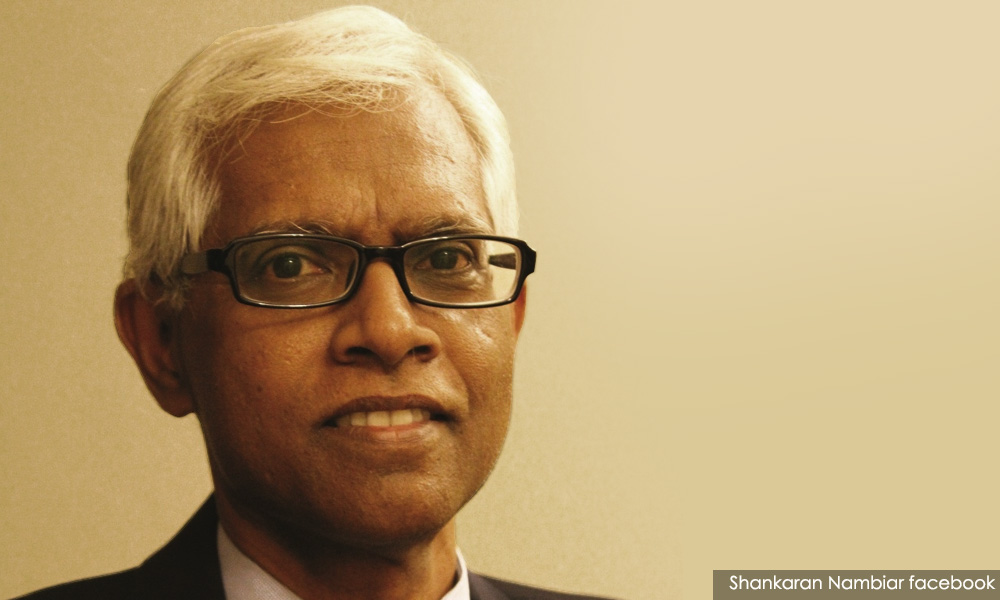
Economist Shankaran Nambiar's (above) book "Economy on the Edge of Transformation" dedicated six chapters to New Malaysia, post-regime change during GE14, with suggestions on "What has to be done now?".
He proposed that Prime Minister Dr Mahathir Mohamad gain the confidence of the people to prove he has a cohesive coalition.
He said Mahathir has to convince the people and the market that he has a clear economic roadmap.
Fourteen months have passed since Shankaran wrote those chapters, while we ponder if Mahathir has done as he has suggested.
"Politically speaking, he has a tough job ahead of him. I think he is trying his best to hold the coalition together despite the low number of seats at his disposal. He is trying to maintain cohesiveness among a bunch of parties that have little in terms of a common ideology," Shankaran told Malaysiakini in an interview.
"Political certainty is a tough nut to crack when questions of succession come up, and the time is ripe for it to come up, " added the senior research fellow at the Malaysian Institute of Economic Research, based in Kuala Lumpur.

"It is admirable that the DAP, which used to sit on the opposite side of the table, is capitulating to Mahathir, but we are in a period of transition rather than in a point of equilbrium, " Shankaran stressed.
Shankaran said the country's economic roadmap is still hazy and he expects it to be unclear for some time more.
He said the global scenario is not to anybody's favour; besides, this is not an age of high oil prices or booming external demand.
"Trying to race an economy on a slippery road is not easy. Many of the questions before us are questions that were asked 20 years ago and which were left unanswered," Shankaran said.
"How do we become a technology-intensive economy? How will we create Made in Malaysia brands that have international appeal? How will we have a highly skilled and creative workforce?" he asked.

These issues and more are discussed in Shankaran's book, published by SIRD early this year.
Author of several books, including 'Malaysia in Troubled Times", Shankaran has consulted for government agencies in Malaysia and for international organisations such as the United Nations and ASEAN Secretariat.
Meanwhile, Shankaran is told that the title of his book sounds edgy, as if Malaysians are standing at the edge of the cliff, waiting to fall.
The Penang-born former lecturer said he used the word "transformation" to indicate some hope for the new Pakatan Harapan government and Malaysian economy.
"We have this wonderful opportunity to undertake transformation, but there is a choice which it may or may not exercise.
"If we are stuck to our old ways, old mental frameworks, old vision, then we will fall off the cliff into a black hole, a zone of lost opportunities," he said.
However, in no way does the author mean to say that the country is going to go into a depression and run into bankruptcy.
He only meant that we could lose the head-start we used to enjoy if we do not embark on real transformation now.
Mahathir was alluding to this when he said he wants Malaysia to become an economic tiger again, Shankaran noted.
"So here is a great opportunity to undertake economic transformation and bring the roar back into the economy.
"There is a nervousness on whether we'd seize the opportunity or lose it, " said Shankaran, who has been a resource person for various capacity-building programmes in Central and Southeast Asia.
Although the 155-page book mostly deals with the Malaysian economy, it also focuses on the manner of governance, the importance of developing resilience - both at the level of the individual and as a country.

Other aspects includes the nurturing of creativity and the entrepreneurial skills that have been "visibly neglected."
"Some of these things are long-term problems in the sense that it would take 10 or 20 years to see any outcome on them," Shankaran said.
"But a start has to be made and now is the time" .
Shankaran said his book tries to address the big patches that policy makers have tended to ignore or that do not receive much attention.
He believes the reader would agree with his views on the lack of policy attention in selected areas, but thinks that it is equally possible that the reader would have a different list.
"What I would like to provoke is for people to come out with a list of their own or to contest the list that I have provided.
"In that way, the book invites you to enter into a dialogue, to express a diversity of views on where we are and where we should be heading," Shankaran added.
Asked what message he was trying to convey through his book, Shankaran said it would be the call to return to basics.
He said this applies to macroeconomic policy, as it does to the bumiputera policy.

"The bumiputera are hardworking; you only need to go to a pasar malam to witness this.
"The problem is one of scalability. The government has not been able to transform this into a large enough scale," Shankaran claimed.
"The right mechanism to create this transition from micro-businessperson to SME owner has not worked out," he said.
"Instead, you find businesspersons being parachuted into the ecosystem."
Shankaran said the same applies to economic policy.
For example, if there is a decline in business confidence, the people at the helm of power have to accept the lower business confidence for what it is.
"It is an indicator that shows where work has to go to reinvigorate confidence.
"Instead, attempts are made to deny perceptions," he lamented. - Mkini


No comments:
Post a Comment
Note: Only a member of this blog may post a comment.